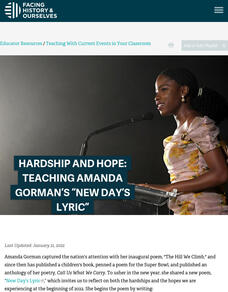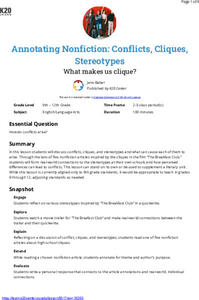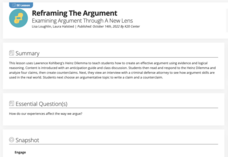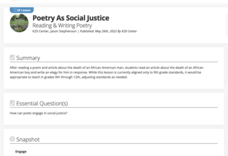American Museum of Natural History
Mint Your Own Coin
Provide young archaeologists with an opportunity to craft their own artifacts. The step-by-step directions in an engaging resource show them how to mint their own coin, complete with image, date, and motto.
Greater Good Science Center
Thank You for Believing in Me
The fourth and final lesson in the Gratitude series has learners craft and deliver a Gratitude Letter to a significant person in their lives. Writers include information about how they benefitted from the attention of the benefactor, an...
Nemours KidsHealth
Cyberbullying: Grades 9-12
A bully, a victim, and a bystander—far from the beginning of a joke, cyberbullying is no laughing matter. Bystander or upstander? As part of the study of cyberbullying, high schoolers first read a series of articles about cyberbullying...
Simon & Schuster
Curriculum Guide to: Pride and Prejudice by Jane Austen
An 18-page curriculum guide for Jane Austen's Pride and Prejudice consists of five lessons. The first plan asks readers to compare the manners, social behaviors, and class issues in Austen's novel to today's. Next, pupils examine a...
Newseum
Reporting Part II: Beyond the Basics
Scholars examine the articles written for the series' first lesson and select ones that would benefit from further research. In a 48-hour deadline, teams of three select one topic to investigate in greater depth and craft a revised...
Facing History and Ourselves
Hardship and Hope: Teaching Amanda Gorman's "New Day's Lyric"
Class members come together to study Amanda Gorman's poem "New Day's Lyric." After a close reading of the poem, learners watch a video of Gorman reading her poem, and then craft additional lines for the poem where they offer suggestions...
National Endowment for the Humanities
The Glass Menagerie: Impact of Expressionism
Young scholars are challenged to write a realistic analysis of Tennessee Williams' nonrealistic memory play, The Glass Menagerie. Writers use the evidence gathered on their worksheets to craft an effective thesis and concluding statement...
National Endowment for the Humanities
The Metamorphoses and Modern Poetry: A Comparison of Mythic Characters
To gain an appreciation of the power of point of view, class members compare Ovid's version of the myth of "Orpheus and Eurydice" with that used by H.D. in her poem, "Eurydice." Individuals then craft a reflection in which they use...
Facing History and Ourselves
Bio-poem: Connecting Identity and Poetry
Writing a bio-poem is a great way to have young scholars go below the surface and reflect on who or what has made them who they are. Check out this richly detailed lesson that provides step-by-step directions for crafting a bio-poem.
Overcoming Obstacles
Using Communication Skills Effectively
Miscommunication is often the basis of conflict. To improve their communication skills, pupils first review what they learned about assertive (as opposed to aggressive or passive) communication, role-play several scenarios, and then...
K20 LEARN
Active Shakespeare: Making Shakespeare Accessible
Two sonnets, both alike in theme and story, break from ancient language to new glory. The prologue to Act I of Romeo and Juliet provides scholars with an opportunity to examine the language Shakespeare uses to create timeless stories....
K20 LEARN
Annotating Nonfiction - Conflicts, Cliques, Stereotypes: What Makes Us Clique?
John Hughes' The Breakfast Club takes center stage in a lesson about annotating nonfiction texts to keep track of evidence that may be used later in discussions and writings. Scholars consider the stereotypes and conflicts presented in...
Anti-Defamation League
Hair Discrimination and the CROWN Act
The CROWN Act (Creating a Respectful and Open World for Natural Hair) is the subject of the lesson that asks groups to research the stories of five different women and share their insights in a jigsaw activity. Participants then craft...
Curated OER
"The Story of an Hour" Lesson 5: Teacher's Guide and Notes
Learning how to craft a compelling argument supported by evidence and logical reasoning is an essential skill. The fifth lesson in "The Story of An Hour" unit asks young scholars to formulate an argument in response to the question, 'Is...
Anti-Defamation League
Columbus Day or Indigenous Peoples Day?
"Columbus Day"? Indigenous Peoples' Day"? "Native Americans' Day"? The controversy over what to call the federal holiday celebrated on the second Monday in October is the focus of a lesson that asks high schoolers to consider various...
Anti-Defamation League
Should Washington's NFL Team Change Their Name?
"What's in a name?" Is it irrelevant, as Juliet suggests in Shakespeare's play, or is nomenclature deeply significant? Young scholars weigh in on the debate by examining the controversy over the NFL's Washington, D.C. Redskins. Groups...
K20 LEARN
Reframing the Argument: Examining Argument through a New Lens
As part of a study of crafting compelling arguments, class members tackle the problem presented in Lawrence Kohlberg's "The Heinz Dilemma." After discussing the dilemma with classmates, writers draft an essay with a claim, support it...
K20 LEARN
Poetry as Social Justice: Reading and Writing Poetry
Words can be a powerful tool in the hands of a poet. Class members examine a poem written by Ross Gay in response to the death of Eric Garner and a news report of the same death. They then read an article about the death of Tamir Rice...
K20 LEARN
Totally Different Stories: Perspective
Two stories by Kate Chopin provide high school freshmen with an opportunity to reflect on the importance of the perspective from which a story is told. Class members read "The Story of an Hour" and a passage from The Awakening, then...
PBS
Write a New Year Poem Inspired by Amanda Gorman’s "New Day’s Lyric"
Here's a new take on a new year. After watching and discussing the video of Youth Poet Laureate Amanda Gorman performing her "New Day's Lyric," young poets craft poems that reflect their feelings about the past year and their resolutions...
C3 Teachers
African Americans and the Civil War: How Did African Americans Experience the Civil War?
To understand African Americans' involvement in the United States Civil War, high schoolers gather evidence from primary source images, census reports, and documents. As a summative performance task, individuals craft an argument,...
Utah Education Network (UEN)
7th Grade Poetry: Ode Poem
Walt Whitman's "Captain, My Captain" and Robert Frost's "The Road Not Taken" provide seventh graders with examples of odes. After reading and discussing these and other examples, young poets craft an ode and respond to the ode of a...
Utah Education Network (UEN)
7th Grade Poetry: Metaphor Poem
The second lesson plan in a five-part poetry unit asks seventh graders to construct a metaphor poem. First, pupils examine Emily Dickinson's "The Railway Train" and identify the metaphor. They then select an object and an animal and...
Curated OER
What Is Poetry?
The first lesson plan of 12 in a poetry unit asks class members to develop their own definition of poetry. After crafting a response, they examine a variety of examples and decide if the resources are or are not poems.
Other popular searches
- Arts and Crafts
- Arts and Crafts Movement
- Christmas Arts and Crafts
- Arts and Crafts Winter
- Christmas Crafts
- Collage & Crafts
- Preschool Arts and Crafts
- Flowers +Craft
- Collage Crafts
- Writers Craft
- Seasonal Arts and Crafts
- Arts and Crafts Activities

























